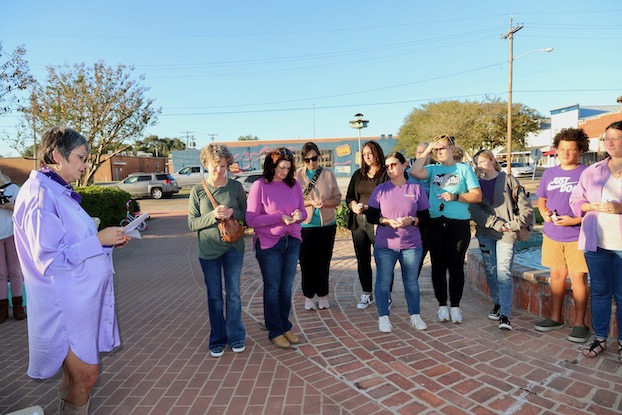Breaking the silence about domestic violence
Published 8:58 am Saturday, October 19, 2024

- Communities Against Domestic Abuse Director Cynthia Petry reads some of the 70 names of domestic abuse victims who have lost their lives in Louisiana in the past year Thursday during a domestic violence candlelight vigil in Jennings. (Doris Maricle / American Press)
Cortney Hornsby, a survivor of domestic violence, knows all about taking her pain and struggles and turning it into strength and healing.
Hornsby shared her story of residence Thursday with those attending the Communities Against Domestic Abuse’s (CADA) candlelight vigil at Founder’s Park. The vigil is held annually as part of Domestic Violence Awareness Month.
Hornsby said she wants to give other victims a chance to break the silence, seek help when they need it and take back control of their lives.
“I just want to get the word out that we need to break our silence,” Hornsby said, noting that many victims of domestic abuse are afraid and ashamed to talk about it for fear of being blamed. “I know God protected me so many times so that I could use my pain to help others.”
Hornsby shared personal experiences about how her abuser threatened to kill her, held guns to her head, choked and punched her and continued to stalk her after she left him.
Hornsby said domestic violence is often a silent epidemic, hidden behind closed doors.
“I think it is an epidemic that often destroys families and many lives,” she said. “It will continue to do so as long as we keep silent and as long as we regard it as a private matter, or a family issue.
“I think there’s a lot of embarrassment in speaking out, but if we can come together to break that silence there is a lot of hope that can be given to these victims.”
According to statistics, Hornsby said one in four women and one in seven men will be victims of domestic violence in their lives. Many of those cases go unreported because the victims remain silent, she said.
“Domestic violence doesn’t discriminate,” she said. “It crosses all ages, races, genders and economic status. It’s not defined to one group.”
She said there is help and resources available for people suffering from physical, mental, emotional, sexual and financial abuse.
‘There are people out there willing to help and willing to listen,” she said.
Hornsby said she came from a great family with no domestic abuse.
“I didn’t know what domestic abuse was or understand divorce because that didn’t happen in my community and because of the way I grew up,” she said. “I had good parents who raised me well.”
After Hornsby’s first marriage ended in divorce, she ended up in an abusive three-year relationship. She reached her breaking point when her abuser nearly choked her to death in front of her young daughter.
“The day we moved in together the abuse started,” she said.
At first it was needing to know where she was all the time and accusing her of cheating. It escalated into physical and sexual abuse and later stalking. She lost her self-esteem, confidence and became more isolated from her family and friends.
“It got to a point I didn’t feel I had anyone to turn to,” she said.
Today, Hornsby said her physical and emotional scars are healing.
“I’m safe now and happily married for five-and-a-half years,” she said.
CADA Directory Cynthia Petry said domestic violence is often a best-kept secret.
“No one likes to talk about domestic abuse, but it’s here and it’s in our backyard,” Petry said. “You think it’s not happening, but it’s right here. It’s scary.”
During the vigil, Petry read some of the 70 names of domestic abuse victims who have lost their lives in Louisiana in the past year, including those from Lake Charles and Lafayette. Many of those died at the hands of someone who was supposed to love them, she said.
•
CADA is a nonprofit dedicated to domestic violence. For more information visit jeffdavidcada.com





